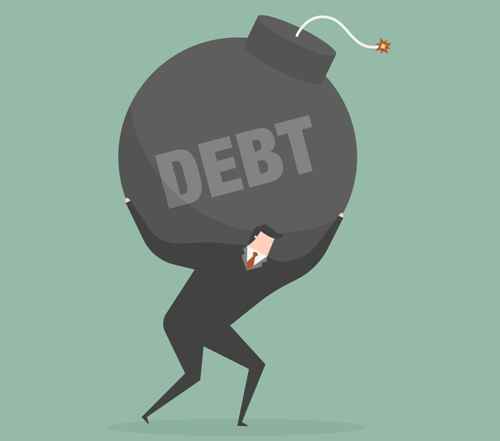Being a financially responsible individual, have you ever wondered how to improve your credit score after debt settlement?
If you are struggling with managing your finances, debt settlement can be a lifeline! However, once you settle your debt, your credit score is likely to drop.
In this article, we have explained some strategic measures that can help you rebuild your credit score.
So, if you are wondering how to improve your credit score following a debt settlement, this guide should help you.
What is debt settlement? How does it impact your credit score?
Before we explore viable strategies to improve your credit score, it’s crucial to understand how debt settlement affects your credit profile.
The process of debt settlement requires you to negotiate with lenders to pay off a part of your debt.
However, this can have an adverse impact on your credit score due to the following factors:
Late payments
Did you miss out on any payment before reaching the debt settlement agreement with your lender? Remember, defaulting on repayments can damage your credit score.
Account status
Once you settle a debt with a lender, the account will be tagged as ‘Settled’ on your credit report. This shows that you lack creditworthiness, which can negatively impact your credit score.
Credit utilization
Once you settle a debt, your credit utilization ratio is impacted. After a debt settlement, the overall debt balances would be low. This can also be a crucial factor to consider as it affects your credit score.

How to improve your credit score after settling a debt?
In this section, we have come up with some actionable steps after settling your debt.
If you are wondering how to improve your credit score after it takes a hit, these guidelines should help you rebuild your credit profile.
1. Review your credit report
In the first place, reach out to one of the major credit bureaus in the UK like TransUnion, Equifax, or Experian. Obtain the latest copy of your credit report and scrutinize it.
In case you detect any error or inconsistency, dispute them instantly. Make sure to have a clean and error-free credit report that forms the foundation of your credit score.
2. Create a budget
Budgeting is crucial as it can save you from financial setbacks as you start working on improving your credit score.
So, establish a realistic budget that includes your income, expenses, and savings. As a financially responsible individual, strive to stick to this budget.
Avoid making impulse purchases and accumulating new debt. Also, make timely payments for your ongoing obligations to maintain a clean credit record.
3. Pay your bills on time
To maintain a healthy credit score, make sure to pay off your bills on time. Experts recommend setting automatic payments or reminders so that you don’t miss out on due dates.
Remember, even a single late payment can mess up your credit score. So, try to remain punctual with your repayment schedule.
4. Maintain a positive payment record
It’s imperative to maintain a healthy credit record to demonstrate your financial responsibility. Consider applying for a credit builder loan or a secured credit card.
These financial products are specifically designed for individuals looking forward to rebuilding their credit. Try to use them responsibly and make timely payments.
In the next three to five years, you should have a positive payment history.
5. Maintain low balances on credit cards
Your credit score largely depends on your credit utilization ratio. If you are wondering how to improve your credit score, try to lower your credit utilization. As a thumb rule, your credit card usage shouldn’t exceed 30% of the available credit limit. When you reduce your credit card usage, you can improve your credit score.
6. Have a healthy credit mix
Do you know that mixing up your credit accounts can boost your credit score?
While you might focus solely on credit cards, don’t miss out having other types of loans like a personal loan, car loan, or a consumer durable loan.
Managing a calculated mix of loan accounts positively impacts your credit score.
7. Don’t close your old accounts
The length of your credit history goes a long way in determining your credit score. So, try not to close old credit accounts.
Even if you use them once in a while, they add to the overall creditworthiness. Therefore, try to keep your old credit accounts active.
8. Monitor your credit score regularly
How frequently do you check your credit score? Make sure to remain informed on changes in this score.
When you regularly monitor your credit profile, you can verify the changes that reflect. A vigilant stance can help you identify any issue and report the same promptly.
FAQs
How long will it take for me to improve my credit score after settling a debt?
The time necessary to improve your credit score after settling a debt varies from one person to another. After implementing the best practices as recommended, you can notice your credit profile improving in a few months. However, rebuilding your score with a clean credit record can take even more than a year.
Can I get a credit card after settling a debt?
Yes, you can get a credit card after settling a debt. Apply for a secured credit card which requires you to pay a security deposit. This can help you get a better credit score.
Are there any quick fixes to improve my credit score?
No, fixing your credit score takes time. While your credit profile might undergo a drastic deterioration after defaults or debt settlements, rebuilding your credit takes a longer period. Be cautious of companies that promise quick fixes for your credit score, as they can land you in a scam.
Conclusion
Worried about how to improve your credit score?
Well, rebuilding your credit score after debt settlement takes time, and the process doesn’t work overnight. It’s imperative to cultivate discipline and patience to regain financial stability and have a healthy credit score.
In this article, we have explained how you can try and make a positive difference in your credit score. Adhering to these guidelines, you can improve your credit profile and demonstrate better financial responsibility.






